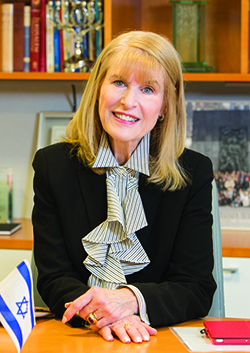Hadassah
President's Column
Zionism Is a Jewish Right
 The High Holidays bring a sense of renewal as well as continuity with generations past. As they draw near this year, it’s worth recalling what was happening 120 years ago, just before Rosh Hashanah: A three-day meeting that would utterly transform Jewish history.
The High Holidays bring a sense of renewal as well as continuity with generations past. As they draw near this year, it’s worth recalling what was happening 120 years ago, just before Rosh Hashanah: A three-day meeting that would utterly transform Jewish history.
It was on August 29, 1897, that Theodor Herzl convened the First Zionist Congress in Basel, Switzerland, launching the Jewish national independence movement we still call Zionism. It led, 50 years later, to the restoration of Jewish sovereignty in the historic Land of Israel.
Even before Israel won independence, Zionism made the Jewish people a nation, uniting Jews of different countries and colors, religious streams and political views. It changed the way Jews looked at themselves. It taught us to recognize and love Jewish diversity and animated Jewish political participation not just on behalf of building Israel but also in the civic life of Diaspora nations.
Over the decades, Zionism awakened Jewish identities in the Soviet Union and Ethiopia, and even in people whose ancestors had been forcibly converted during the Inquisition. And it was Zionism, in the form of Hadassah, that brought women to the table of Jewish leadership.
Anti-Semitism existed before the First Zionist Congress and it exists today. But one fundamental thing is different: Jews have power. It’s not the power of a few wealthy citizens who can be impoverished, expelled or murdered on the whim of a king, dictator or mob, but the kind of power that can defend itself. It’s not the kind of power that grows out of tolerance that might be temporary, but based on an army in Israel and constitutional rights in nations where the vast majority of Diaspora Jews now live.
Zionism has always been under fire. It was publicity surrounding the First Zionist Congress that inspired the anti-Semitic forgery, The Protocols of the Elders of Zion. Contemporary attacks come not only from enemies but also from people with whom, on many other issues, we may agree. They look at an Israeli-Arab or Israeli-Palestinian conflict that is older than most people alive today and seek a convenient explanation—or a scapegoat.
Of all the national independence movements of the past century—many of which sparked wars and created refugees—Zionism’s detractors single out the Jewish national liberation movement for censure. People ignorant of or indifferent to all the military occupations in the world today—China in Tibet, Morocco in Western Sahara, Turkey in northern Cyprus, Indonesia in western New Guinea, Russia in Ukraine, Moldova and Georgia, to name just a few—apply a different yardstick, a delegitimizing standard, to Zionism.
Zionism is not what’s wrong with the world—or even with the Middle East. Zionism is the Jewish right to national independence.
Criticism of Israel—its government, its actions, its policies—is legitimate. Some of the biggest critics of the Jewish state are Israelis who call themselves Zionists. But can there be any doubt that the calls for boycotts and sanctions, the obsession applied uniquely to the world’s one Jewish nation—where close to half the population descends from Jewish refugees who fled or were expelled from Arab nations—is nothing but thinly disguised anti-Semitism?
Hadassah, the Women’s Zionist Organization of America, is proud of its name and proud to be the only organization with “Zionist” in its name to gain NGO status in the United Nations. Our landmark speaker series, Defining Zionism in the 21st Century, is part of our effort to deny our enemies the right to tell us what our national movement is and what it means.
As we celebrate the 120th anniversary of the Zionist movement and also experience the spiritual renewal of the holiday season, let’s make sure that Zion—a synonym for Jerusalem and Solomon’s Temple dating back to the book of Samuel—beats in Jewish hearts.
A happy and healthy New Year to you all!










 Facebook
Facebook Instagram
Instagram Twitter
Twitter
Rita Shapiro says
Hi Ellen,
This magazine edition came out just as we were meeting in a members home for our defining Zionism/television night and we read your message. It was apropos and inspiring. We are using defining Zionism for a study group and have been very successful with it. L’Shanna Tovah.